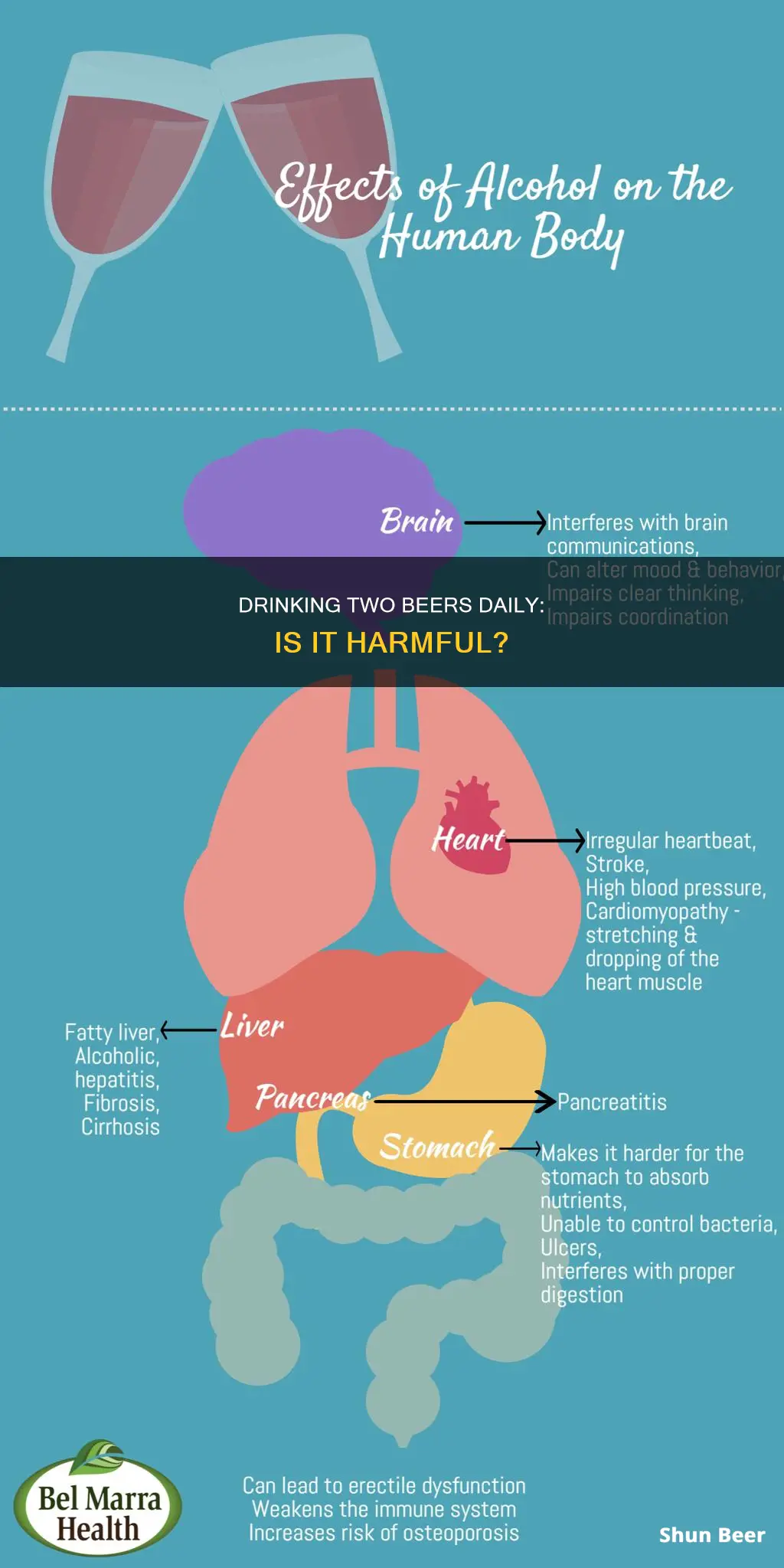
Drinking two beers a day is a topic of much debate. While some sources claim that drinking two beers a day is not harmful and may even have some health benefits, others argue that it can lead to negative health consequences and increase the risk of certain diseases. It is important to note that the effects of alcohol consumption can vary depending on factors such as age, gender, weight, and overall health. Additionally, the definition of a standard drink varies and can include 12 ounces of regular beer, 5 ounces of wine, or 1.5 ounces of distilled spirits.
According to the National Institute on Alcohol Abuse and Alcoholism, the weekly upper limits for healthy adults are four drinks in one day or 14 per week for men, and three drinks in one day or seven per week for women. Exceeding these amounts is considered heavy or at-risk drinking and can increase the risk of developing health problems such as liver damage, heart issues, and certain types of cancer.
On the other hand, some studies suggest that moderate alcohol consumption may be linked to certain health benefits, such as improved heart health. However, other research disputes these findings and suggests that even moderate drinking can increase the risk of breast cancer and stroke. It is generally recommended to avoid alcohol completely if an individual is pregnant, planning to drive, taking medications that interact with alcohol, or living with a medical condition that could be worsened by alcohol.
Ultimately, the effects of drinking two beers a day can vary depending on individual factors, and it is always a good idea to consult with a healthcare professional to understand the risks and make informed decisions about alcohol consumption.
| Characteristics | Values |
|---|---|
| Number of drinks considered "heavy" drinking for men | 5 or more drinks on any day or 15 or more per week |
| Number of drinks considered "heavy" drinking for women | 4 or more drinks on any day or 8 or more per week |
| Number of drinks considered "moderate" drinking for men | 2 drinks or less a day |
| Number of drinks considered "moderate" drinking for women | 1 drink or less a day |
| Number of drinks considered "risky" drinking for men | More than 4 drinks on any given day |
| Number of drinks considered "risky" drinking for women | More than 3 drinks on any given day |
| Number of drinks considered binge drinking for men | 5 or more "standard" drinks in 2 hours |
| Number of drinks considered binge drinking for women | 4 or more "standard" drinks in 2 hours |
| Number of drinks considered "standard" | 12 ounces of regular beer, 5 ounces of wine, or 1.5 ounces of distilled spirits |
| Number of drinks considered "heavy" drinking in a week for men | 14 |
| Number of drinks considered "heavy" drinking in a week for women | 7 |
| Number of drinks considered "moderate" drinking in a week for men | 14 |
| Number of drinks considered "moderate" drinking in a week for women | 7 |
What You'll Learn

Is drinking two beers a day considered risky drinking?
Drinking two beers a day is considered risky drinking for women, but not for men, according to the US Dietary Guidelines. However, the World Health Organization (WHO) states that there is no safe amount of alcohol.
In the US, a "standard" drink contains about 14 grams of pure alcohol. This is roughly equivalent to 12 ounces of regular beer, 5 ounces of wine, or 1.5 ounces of distilled spirits. Therefore, two beers a day would be considered four "standard" drinks for women and two "standard" drinks for men.
Drinking more than the recommended weekly limits can lead to health problems and put individuals at a higher risk of developing an alcohol use disorder. According to the National Institute on Alcohol Abuse and Alcoholism, binge drinking is consuming enough alcohol to raise one's blood alcohol concentration (BAC) to 0.08% or higher. For men, this typically occurs after five or more "standard" drinks in two hours, while for women, it occurs after four or more "standard" drinks in two hours.
Excessive alcohol consumption can have negative effects on the body, including liver damage, increased risk of stroke, heart muscle damage, and increased blood pressure. It has also been linked to several types of cancer. Additionally, alcohol can interact with certain medications and worsen specific medical conditions. Therefore, it is essential to drink in moderation and be aware of the risks associated with excessive alcohol consumption.
Beer and Keflex: Safe Mix or Health Risk?
You may want to see also

What are the health implications of drinking two beers a day?
Drinking two beers a day can have several health implications, and it is important to note that the effects may vary between individuals. While some studies suggest that moderate drinking may be linked to certain health benefits, such as red wine and heart health, other research indicates no benefit and links moderate drinking to diseases like breast cancer and an increased risk of stroke.
According to the National Institute on Alcohol Abuse and Alcoholism, the upper limits for healthy adults are four drinks in one day or 14 per week for men, and three drinks in one day or seven per week for women. Drinking more than these amounts is considered "heavy" or "at-risk" drinking and increases the risk of developing health problems.
Excessive alcohol consumption can have several negative consequences on the body. It can affect the liver, leading to inflammation (alcoholic hepatitis) and potentially life-threatening scarring (cirrhosis). Additionally, it can increase the risk of stroke, damage the heart muscle (cardiomyopathy), and raise blood pressure. Alcohol is also linked to an increased risk of certain types of cancer.
It is important to note that the definition of "standard" drinks may vary. In the United States, one "standard" drink typically contains about 14 grams of pure alcohol, which is generally the amount found in 12 ounces of regular beer, 5 ounces of wine, or 1.5 ounces of distilled spirits. However, different types and brands of alcoholic beverages can have varying alcohol content, so it is essential to check the labels and be mindful of serving sizes.
To assess whether one's drinking habits are problematic, it is crucial to consider factors such as the ability to function, the impact on relationships, and the presence of negative health effects. Taking intentional breaks from drinking and consulting a healthcare professional can also provide valuable insights.
Beer and High Liver Enzymes: Is It Safe to Drink?
You may want to see also

What is the recommended daily alcohol intake?
The recommended daily alcohol intake varies depending on factors such as age, sex, and health status. According to the US Dietary Guidelines, adults of legal drinking age can choose not to drink or to drink in moderation by limiting their intake. For men, this means consuming no more than two drinks per day, while for women, it is recommended to have no more than one drink per day. These guidelines are based on binary sex assigned at birth and not on gender identity.
For adults aged 65 and older, the recommended limit is one drink per day and no more than seven drinks per week for both men and women. It is important to note that drinking less is better for health than drinking more, and certain people should avoid alcohol completely. This includes individuals who are pregnant or planning to become pregnant, those taking certain medications, those with certain medical conditions, and those under the age of 21.
In addition, it is important to avoid binge drinking, which is defined as consuming four or more drinks for females and five or more drinks for males on the same occasion, typically within about two hours. Binge drinking increases the risk of alcohol-related health problems and can lead to alcohol use disorder.
While moderate alcohol consumption may be linked to certain health benefits, current research suggests that the less alcohol consumed, the better. The risks associated with alcohol intake include an increased risk of liver disease, alcohol use disorder, and social harms such as relationship problems. Additionally, alcohol can interact with certain medications and increase the risk of adverse effects.
It is important to note that the definition of a "standard" drink may vary across countries and regions, and individuals should refer to their local guidelines for specific recommendations.
Beer and the Feast of Unleavened Bread: What's Allowed?
You may want to see also

How does drinking two beers a day affect the brain?
Drinking two beers a day can have a detrimental effect on the brain, with research suggesting it can cause structural damage and loss of brain volume.
A study by the University of Pennsylvania, published in Nature Communications, analysed over 36,000 MRI brain scans and found that drinking two beers a day was associated with brain changes equivalent to ten years of ageing. The study found that two beers a day reduced overall brain volume and grey matter volumes across a number of areas, as well as microstructures in the white matter.
The effects of two beers a day on the brain are reasonably small, with the loss of brain volume equivalent to what would be expected over six months of ageing. However, the effect is not linear, and the impact compounds with each additional drink. Therefore, the jump from one to two beers a day was found to be roughly equivalent to two years of brain ageing.
The study also found that the results were similar even after removing heavy drinkers from the data, indicating that it doesn't matter how much an individual consumes, the damage will be done.
Is Barq's Root Beer Safe for Pregnant Women?
You may want to see also

How many days a week should you have off from drinking?
The number of days a week a person should have off from drinking depends on a variety of factors, including their age, sex, weight, and overall health. According to the National Institute on Alcohol Abuse and Alcoholism, the weekly "upper limits" for healthy adults are four drinks in one day or 14 per week for men, and three drinks in one day or seven per week for women. Drinking more than these amounts is considered "heavy" or "at-risk" drinking, which means it puts you at a higher risk for developing health problems. About one in four people who drink more than this have an alcohol use disorder.
The Substance Abuse and Mental Health Services Administration (SAMHSA) considers drinking five or more "standard" drinks on the same occasion on at least one day in the past 30 days as binge drinking. Binge drinking is defined by the World Health Organization as consuming at least 60 grams of pure alcohol (roughly six drinks) per occasion.
According to a study published in Nature Communications, drinking four units of alcohol a day causes structural damage and brain volume loss equivalent to ten years of aging. This amount of alcohol is equal to two beers or two glasses of wine. The study also found that the effect of alcohol on the brain is not linear; the more you drink, the more your brain ages.
Therefore, it is recommended that individuals have at least two days off from drinking per week to allow their liver to recover. This is especially important for those who drink close to the weekly upper limits or engage in binge drinking.
Tramadol and Non-Alcoholic Beer: Safe Mix or Not?
You may want to see also
Frequently asked questions
According to the National Institute on Alcohol Abuse and Alcoholism, the recommended upper limit for healthy adults is 4 drinks in one day or 14 per week for men and 3 drinks in one day or 7 per week for women. Drinking more than these amounts is considered "heavy" or "at-risk" drinking, which means that it puts you at a higher risk for developing health problems. However, drinking 2 beers a day is not necessarily bad for your health. In fact, some studies show that moderate drinking may be linked to certain benefits, such as red wine and heart health.
If you are drinking more than the recommended upper limits, you may be drinking too much. Additionally, if you are using alcohol to cope with stress or other negative emotions, it may be a sign that you are drinking too much. It is important to be aware of the amount of alcohol you are consuming and to drink in moderation.
If you are concerned about your beer intake, there are several things you can do to cut down. First, try to limit your drinking to mostly weekends or special occasions. Second, try to have some days off from drinking to give your liver time to recover. Finally, if you feel that you are addicted to alcohol, seek professional help or support from a health care provider or a support group.







